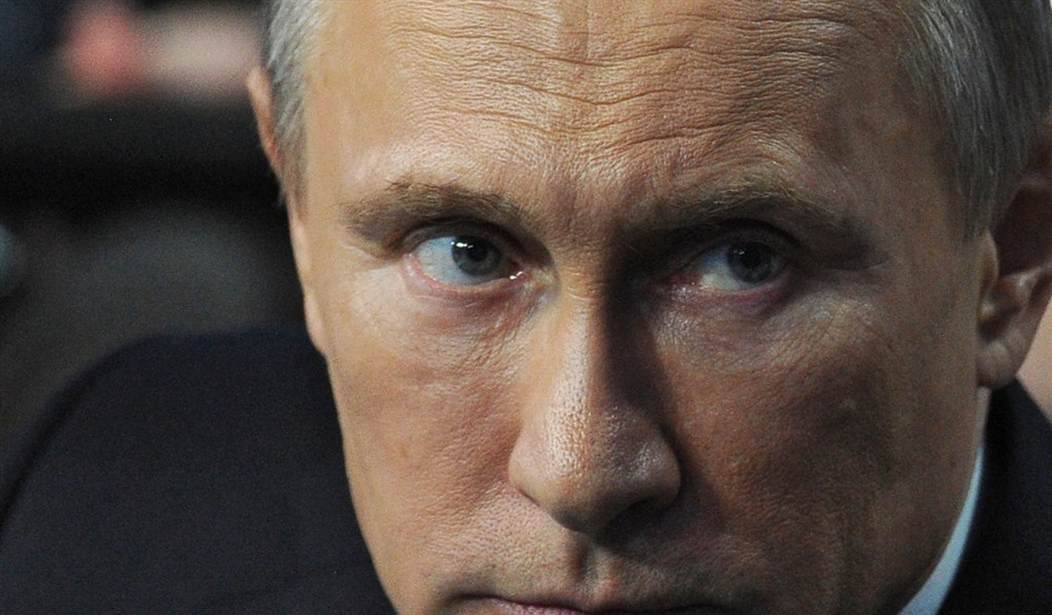In the May issue of Townhall Magazine, where this column originally appeared, HotAir’s Erika Johnsen explores whether exporting U.S. natural gas and more E.U. fracking can mitigate Russia’s death-grip on European energy.
As part of his economic agenda, President Obama repeatedly touted the value of bolstering exports as a means to encourage robust economic growth. And while I would caution against increasing exports merely for their own sake, there can be no doubt that free trade is not, as the adage goes, a zero-sum game.
Rather, trade is a mutually enriching way to expand the free market that benefits all parties, and with his explicit export goals in mind, it seems odd that Obama has declined to take better advantage of the United States’ shale oil-and-gas bonanza of the past few years.
Under current law, U.S. natural gas producers are not allowed to export gas to countries unless we have a specialized free trade agreement with them. And companies need permits to build new liquefied natural gas export terminals.
During the first five years of his tenure, Obama’s administration has only approved a handful of these permits, but there are still more than two dozen permit applications on hold from American companies while countries including Japan, Hungary, the Czech Republic, Singapore, South Korea, and more are all actively asking that the U.S. open up the natural gas industry to the healthy, innovative, beneficial competition of the world’s markets.
Of course, it does not help that chemical and manufacturing lobbies have partnered with environmental activists to block trade expansion in Congress. These naysayers argue that more studies are needed to assess the impact that more freely flowing LNG exports would have on our domestic economy. They claim that American natural gas prices could increase as a result of more global competition.
Even if domestic gas prices did increase after more trade, American producers would be the ones supplying the more highly demanded product and hence become the direct beneficiary of those higher prices, meaning that we stand to gain a net economic benefit. Trying to pretend that the universal benefits of free trade somehow do not apply when it comes to the energy sector is usually little more than another means of artificially manipulating free-market signals and dishing out another form of special treatment to rent-seeking lobbyists at direct expense to American consumers.
Meanwhile, the recent Russian invasion of the Crimean peninsula has highlighted yet another potential benefit to allowing more natural gas exports and this one is geopolitical in nature.
The European Union is largely dependent on Russia for about a third of its natural gas supplies. Some individual countries, like Germany, are even more reliant, buying up to 40 percent of its supplies from Russia. And about half of the gas that Europe imports is piped through Ukraine, which in turn gets almost 60 percent of its own gas from Russia.
In light of Vladimir Putin’s recent aggression, many lawmakers are now calling for the Obama administration to get to work on approving more LNG export permits to help quickly increase global supply and thus undercut Russia’s regional energy dominance. Our domestic shale boom has handed us a powerful economic weapon in energy diplomacy, they argue, since Russia is so heavily relying on its energy supplies as an instrument of influence.
Unfortunately, some of these geopolitical arguments are probably overblowing the immediate impact approving LNG exports could realistically have. For one thing, the U.S. government does not sell natural gas. U.S. companies do, and our natural gas supplies will go to the highest bidders, which, as I already mentioned, might be in Asia or South America.
For another, even if the Obama administration were to approve every single pending LNG export terminal tomorrow, they would all take at least couple of years to build and become operational, and Europe also needs to build the requisite import infrastructure to receive that LNG, which is not a small investment.
In the long-term, however, increased global gas supplies can certainly help blunt Russia’s energy-based dominion, which is probably why Putin has made such a transparently self-interested case against fracking technology for years now.
Besides gearing up to receive more LNG from diversified sources like the U.S., Europe needs to get real with their fatuous ambitions for quickly transforming their various economies into high-renewable, low-to-no-fracking, zero-nuclear zones, and instead start embracing fracking and taking advantage of the many indications that they also sit atop plentiful shale gas reserves.
Poland and Britain have led the way in fast-tracking fracking in Europe, and in just the past few months, other E.U. countries have indicated that security concerns should be part of the debate.
Even if increased U.S. exports and more European fracking are not an instant solution to Russia’s geopolitical aggression, employing both policies are good long-term strategies. Countries that cultivate powerful and diversified economies are the ones that can push their weight around on the world stage. The U.S., as well as Europe, should take advantage of fracking and its security bounty.
Erika Johnsen is associate editor of HotAir.com.

























Join the conversation as a VIP Member